Additional Research Resources on Harry Clifton Byrd
Researchers interested in learning more about the life and career of Harry Clifton Byrd may find additional useful information in the following collections:
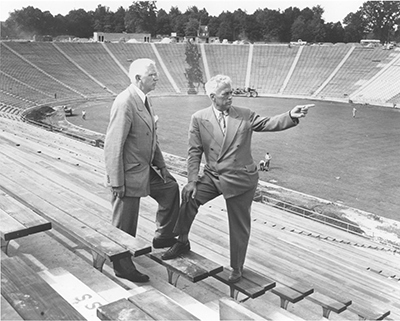

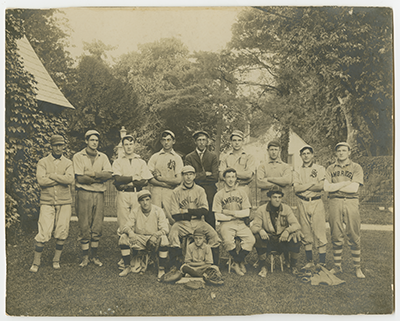
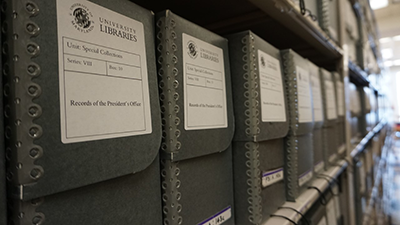
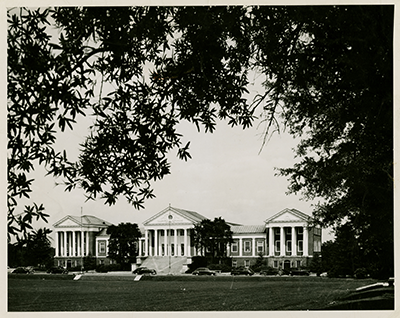
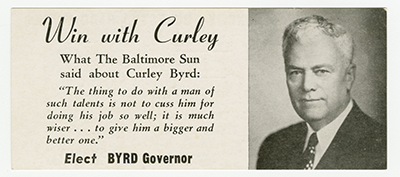
The personal papers of Harry Clifton Byrd consist of correspondence, manuscripts, speeches, printed matter, certificates, memorabilia, photographs, and clippings, related to his involvement in the University of Maryland, political campaigns, commissions, and civic organizations. Topics cover a broad range, including campus matters, state politics, and international affairs. The papers span the period from 1909 to 1970, although the bulk of the material was created between 1923 and 1969.
Sterling Byrd was the youngest of the four children of Harry Clifton Byrd. The bulk of his collection documents his father's life and career and includes an extensive number of photographs, memorabilia items, newspaper clippings, and publications chronicling the elder Byrd's personal life and professional achievements. The Sterling Byrd estate also donated a substantial number of books that belonged to Harry Clifton Byrd as well as documents pertaining to Kate Turnbull Byrd, Sterling's mother, her family, and the Byrd ancestors. In addition, the collection includes a number of significant letters sent to Harry Clifton Byrd and early documents relating to the history of the University of Maryland. The multiple accessions that comprise this collection are unprocessed, but inventories are available for researchers to consult.
The Office of the Director of Libraries was established about 1905 to oversee the administration of the libraries of the University of Maryland. The Library Director's records are of an administrative nature and include correspondence, reports, studies, publications, and budget requests. Series 1, Subseries 2 of the director’s files contains nine folders of correspondence from President Byrd.
The extensive files documenting Byrd’s presidency of the University of Maryland from 1935 to 1954 comprise Series 8 of this record group. This series includes correspondence, reports, financial and budgetary records, meeting minutes, publications, legal documents, newspaper clippings, blueprints, maps, photographs, and other materials. Some files are restricted, due to privacy issues related to student or personnel records.
The records cover campus life, especially at College Park; construction and expansion at the Baltimore, Princess Anne, and College Park campuses; relationships with state and federal government; funding of the university; alumni relations; issues in higher education; athletics; curricula; personnel and student matters; the effects of World War II on the university; integration and education of African American students; admissions; the beginnings of the campus known today as University of Maryland University College; and Byrd's personal civic activities, among a multitude of topics.
Byrd corresponded with a wide range of individuals, including UMD administrators, faculty, staff, and students; political figures and administrators at the state and national levels, especially governors of Maryland; architects for campus buildings; donors to and supporters of the university; other university presidents; and business leaders
The Board of Regents is the highest-level governing body of the University of Maryland system, and their records document overall administration of the university. The files contain correspondence; statements; proposals; reports; and files from specific committees, boards, and commissions, in particular the Committee on the Presidency, the Agricultural Advisory Board, and the Maryland Agricultural Commission. The University of Maryland Archives also holds a significant unprocessed addendum to the Regents' records which includes correspondence, publications, audiotapes, minutes of meetings, budgets, and reports. A preliminary inventory of these unprocessed materials has been prepared; requests to examine these records will be considered on a case-by-case basis. Harry Clifton Byrd interacted extensively with the Regents during his presidency, and these records would reflect those exchanges.
Small amounts of correspondence from and other materials relating to Harry Clifton Byrd are also scattered in other collections, including the Papers of Ronald Bamford, James Bruce, Geary Eppley, Jerome Forrest, Arthur J. Kiser, Theodore R. McKeldin, Harry Jacob Patterson, the Gahan Family, Gordon W. Prange, Albert C. Ritchie, Adele Stamp, Thomas B. Symons, Reginald Van Trump Truitt, Fletcher P. Veitch, and the Records of the Graduate School and the University of Maryland University College.

